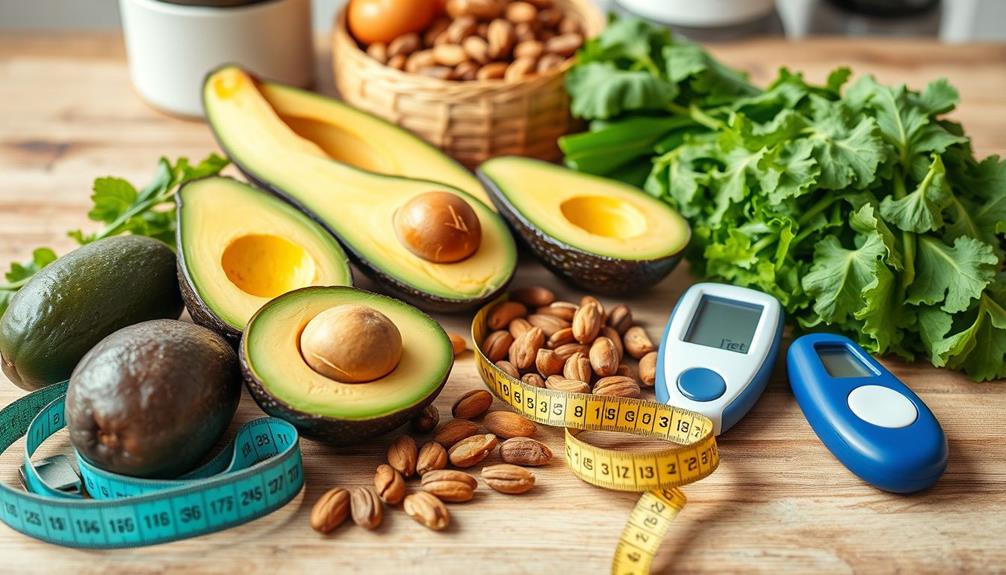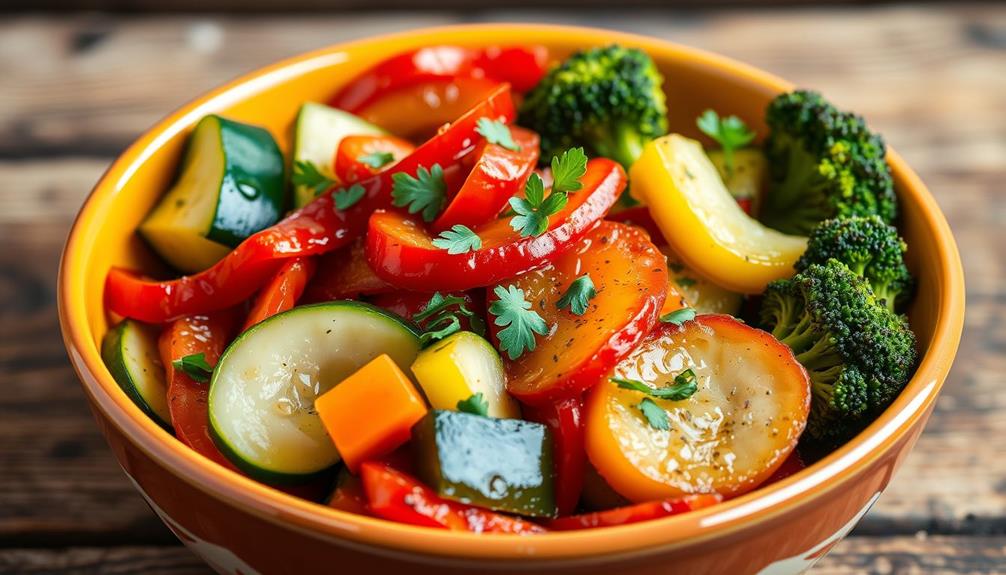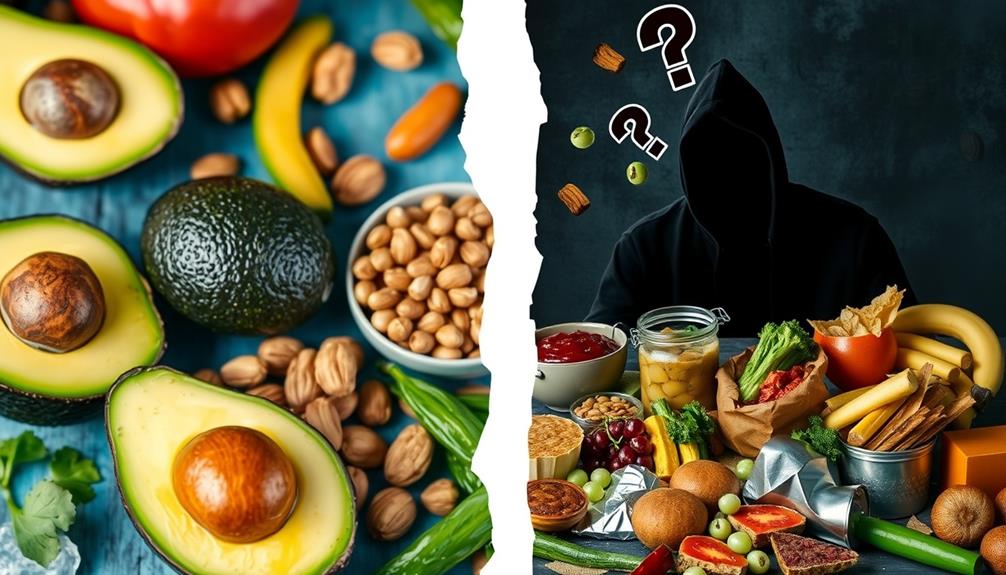The keto diet can greatly improve your insulin sensitivity and help regulate blood sugar levels. By drastically reducing carbohydrates, your body shifts to using fat for energy, which stabilizes glucose levels and minimizes insulin spikes. This process can lead to decreased cravings and more balanced energy throughout the day. Additionally, losing weight while on keto enhances insulin responsiveness, further lowering the risk of type 2 diabetes. However, it's crucial to choose the right foods and stay mindful of potential risks. There's plenty more to uncover about making keto work for you effectively and healthily.
Key Takeaways
- The keto diet reduces carbohydrate intake, stabilizing blood sugar levels and minimizing insulin spikes, which can improve insulin sensitivity.
- Shifting the body's energy source from glucose to fat through ketosis helps enhance insulin responsiveness over time.
- Weight loss achieved via the keto diet can significantly enhance insulin sensitivity and improve overall blood sugar regulation.
- A high-fat, low-carb diet may decrease cravings and promote balanced energy levels, further aiding in metabolic health.
- Careful meal planning is essential on keto to ensure nutrient density while avoiding foods that spike insulin levels.
Insulin Resistance Explained
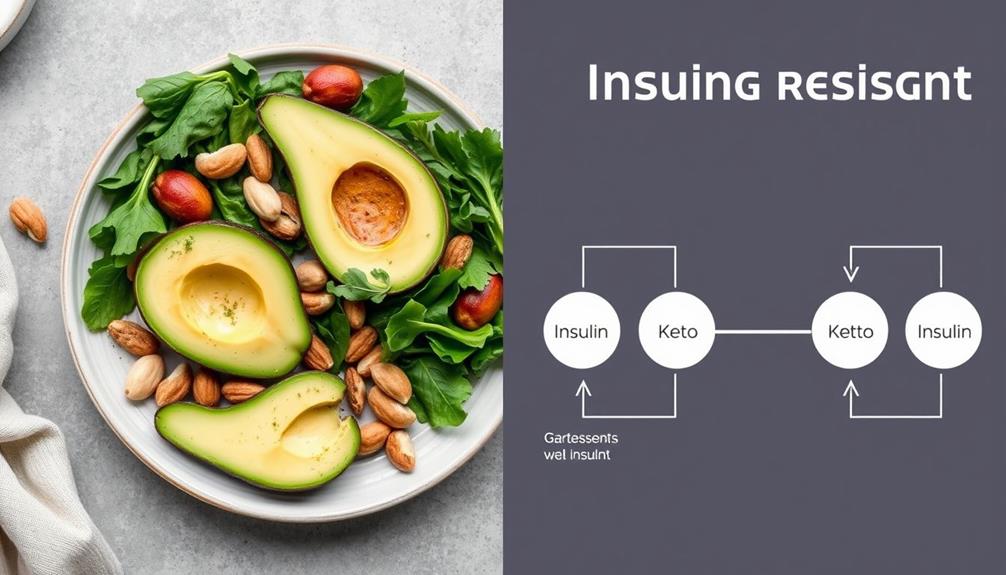
Insulin resistance can sneak up on you, disrupting how your body processes glucose and responds to insulin. When your cells become less responsive to insulin, they struggle to absorb glucose, leading to elevated blood sugar levels.
This condition often develops gradually and can be linked to factors like obesity, inactivity, and poor diet.
Managing insulin resistance involves making dietary changes and incorporating regular physical activity. You might notice symptoms such as fatigue or increased hunger, which can signal underlying issues.
Over time, insulin resistance can increase your risk of developing type 2 diabetes and metabolic syndrome. It's essential to recognize the signs and take proactive steps to improve your insulin sensitivity.
Overview of the Keto Diet

The keto diet, often referred to as the ketogenic diet, primarily focuses on drastically reducing carbohydrate intake while increasing fat consumption. This approach pushes your body into a state called ketosis, where it burns fat for energy instead of carbs.
Research suggests that low-carb diets can aid in improving insulin sensitivity and may be beneficial in managing conditions like diabetes potential benefits of a low-carb diet.
You'll typically consume around 70-75% of your calories from fats, 20-25% from proteins, and only 5-10% from carbohydrates. This shift can lead to various metabolic changes, including improved fat burning and reduced insulin levels.
While it's popular for weight loss and potential health benefits, it's crucial to plan your meals carefully. You'll want to include nutrient-dense, low-carb foods while avoiding sugars and processed items.
Consulting a healthcare professional can help tailor the diet to your needs effectively.
Benefits for Insulin Sensitivity

Many people struggling with insulin resistance find the keto diet beneficial for enhancing insulin sensitivity. By drastically reducing carbohydrate intake, your body shifts from glucose to fat as its primary energy source. This shift stabilizes blood sugar levels and reduces insulin spikes, which helps your cells respond better to insulin over time. This can lead to improved weight management for those struggling with weight loss, as the keto diet can help suppress appetite and promote fat burning. However, it’s important to consult with a healthcare professional before starting any new diet, especially for individuals with insulin resistance or other medical conditions. Additionally, it’s crucial to focus on consuming nutrient-dense foods and maintaining a balanced diet to support overall health and well-being. Another benefit of the keto diet for those with insulin resistance is the opportunity to explore and enjoy delicious keto desserts that are low in carbohydrates and sugar. By using alternative sweeteners and high-fat ingredients like coconut oil and almond flour, you can satisfy your sweet tooth while still following a low-carb eating plan. However, moderation is key, and it’s important to be mindful of portion sizes and overall calorie consumption, even when indulging in these tasty treats. Always prioritize whole, nutrient-dense foods in your diet, and consider including a variety of colorful vegetables, healthy fats, and quality proteins to support your body’s needs.
Implementing a well-structured budget can also support this lifestyle change by allowing you to allocate funds for nutritious high-fat foods. Studies suggest that the high-fat, low-carb approach can lead to improved insulin sensitivity, making it easier for your body to manage glucose.
You'll likely notice a decrease in cravings and a more balanced energy level throughout the day. Overall, adopting the keto diet can be a strategic move for anyone looking to improve their metabolic health and support better insulin responsiveness.
Weight Loss and Blood Sugar
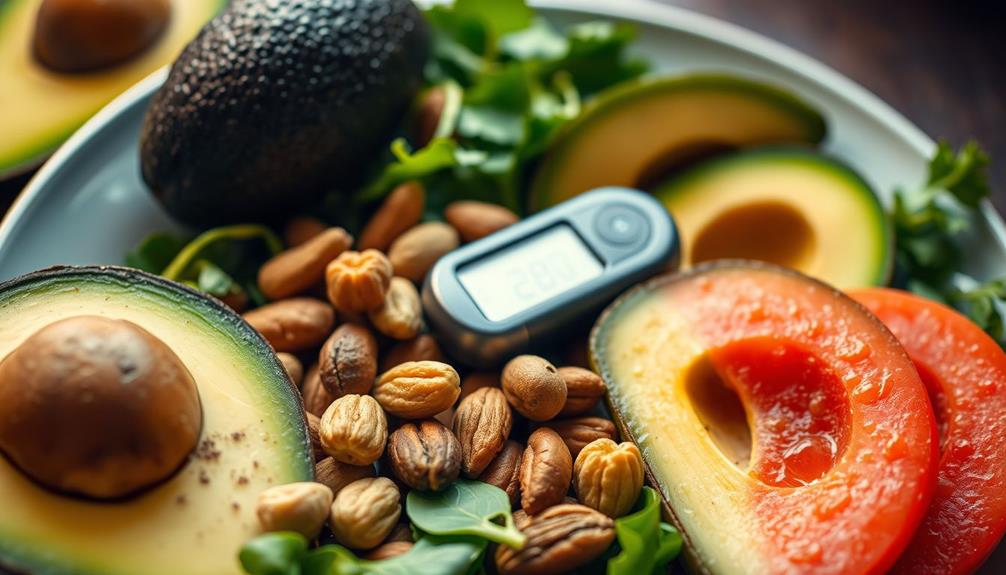
Weight loss plays an essential role in managing blood sugar levels, especially for those with insulin resistance. When you shed excess weight, your body becomes more sensitive to insulin, which helps regulate blood glucose more effectively.
As you lose fat, particularly around your abdomen, you can greatly reduce insulin spikes after meals. This stabilization of blood sugar levels not only makes you feel better but also lowers the risk of developing type 2 diabetes.
Additionally, weight loss can improve your overall metabolic health, enhancing glucose clearance and reducing the likelihood of complications.
Foods to Embrace on Keto

When embracing the keto diet, focusing on nutrient-dense foods is essential for success and overall health.
Incorporate leafy greens like spinach and kale, which are low in carbs and packed with vitamins. Avocados are a fantastic choice, providing healthy fats and fiber to keep you satisfied.
Don't forget nuts and seeds, such as almonds and chia seeds, offering protein and essential nutrients. Fatty fish like salmon and mackerel deliver omega-3 fatty acids, promoting heart health.
Finally, consider low-carb dairy options like cheese and yogurt to boost your protein intake.
By prioritizing these foods, you'll create a balanced, satisfying keto plate that supports your health goals and enhances insulin sensitivity.
Enjoy experimenting with flavors while staying within your carb limits!
Foods to Avoid on Keto

Avoiding certain foods on the keto diet is essential for maintaining ketosis and improving insulin sensitivity. Steer clear of sugary snacks and desserts, as they can spike your insulin levels and disrupt your diet.
White bread, pasta, and other refined carbohydrates should also be avoided since they convert quickly to sugar in your body. Processed foods often contain unhealthy additives and hidden sugars that can sabotage your progress.
Additionally, stay away from high trans fat foods like fried items and packaged snacks, which can harm your metabolism. Focusing on whole, unprocessed foods not only supports ketosis but also enhances your overall metabolic health.
Make mindful choices to guarantee your keto journey is successful.
Risks and Side Effects

Monitoring your food choices is important, but it's equally essential to be aware of the potential risks and side effects associated with the keto diet.
You might experience symptoms like fatigue, digestive issues, or headaches, often referred to as the "keto flu." These can occur as your body adjusts to burning fat for fuel instead of carbohydrates.
Nutritional deficiencies may also arise due to the restricted food groups, so you'll need to plan carefully. Additionally, there's a risk of ketoacidosis, especially if you have insulin resistance.
Staying hydrated and monitoring your electrolyte levels is vital. Regularly check your health markers, like LDL cholesterol, since everyone's response to the diet can vary considerably.
Strategies for Adhering to Keto
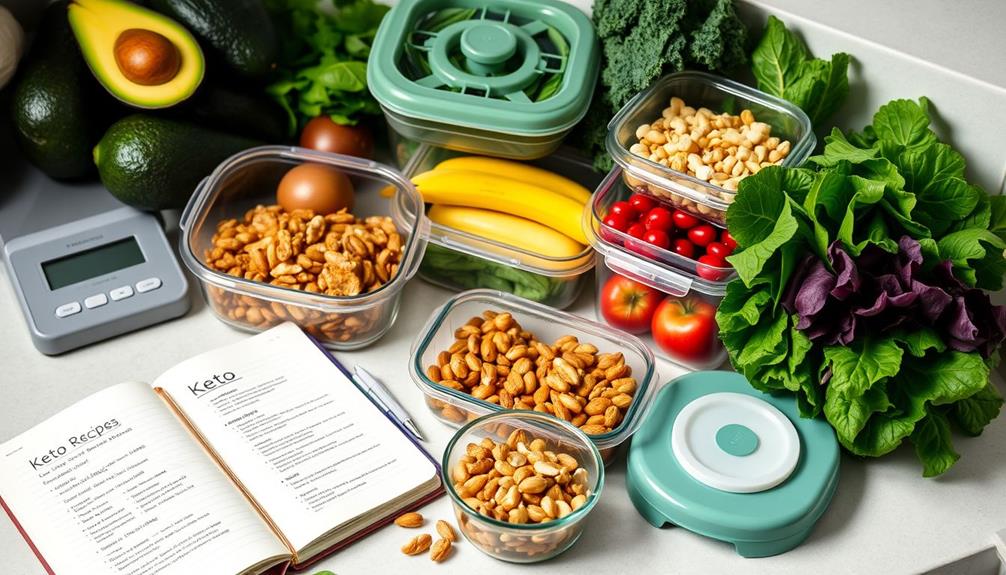
Successfully adhering to the keto diet often requires consistent effort and strategic planning.
Start by meticulously planning your meals to keep carb intake low and guarantee you have keto-friendly options available. Meal prep is a game changer; prepare low-carb meals for the week to reduce the temptation to stray.
Tracking your dietary intake helps you stay focused on your goals, while community support can keep you motivated and accountable. Don't hesitate to seek professional guidance for tailored advice.
Finally, educate yourself about the nutritional content of foods to make informed choices, steering clear of hidden carbs.
With these strategies, you can increase your chances of success on the keto journey.
Frequently Asked Questions
Can the Keto Diet Be Combined With Other Dietary Plans?
Yes, you can combine the keto diet with other dietary plans!
Consider integrating elements from Mediterranean or paleo diets, focusing on whole foods and healthy fats. You might also include intermittent fasting for added benefits.
Just guarantee that your carb intake aligns with keto guidelines. Always listen to your body and monitor how these combinations affect your energy levels and overall health.
Consulting a healthcare professional can help tailor your approach effectively.
How Quickly Can I Expect Results From the Keto Diet?
When you start the keto diet, you might notice changes in energy levels, cravings, and weight within the first week.
By sticking to it, you could see more significant results, like improved mood and fat loss, in about two to four weeks.
The key's consistency—keeping your carbs low, focusing on healthy fats, and staying hydrated.
Listen to your body, adjust as needed, and celebrate small wins along the way!
Are There Specific Supplements Recommended While on Keto?
When you're on a keto diet, certain supplements can really help.
Consider adding magnesium, potassium, and sodium to maintain electrolyte balance, especially during the initial phase.
Omega-3 fatty acids can support heart health, while vitamin D is essential for overall well-being.
MCT oil might boost your energy and help with ketosis.
Always consult your healthcare provider to tailor your supplement plan to your specific needs and guarantee you're meeting your nutritional goals.
How Does Stress Affect Insulin Resistance on a Keto Diet?
Stress can greatly impact your insulin resistance, even on a keto diet.
When you're stressed, your body releases cortisol, which can increase blood sugar levels and make it harder for insulin to work effectively. This can counteract the benefits of your low-carb lifestyle.
To manage stress, consider practices like mindfulness, exercise, or deep breathing. Staying aware of your stress levels can enhance your overall metabolic health and support your dietary goals.
Can Intermittent Fasting Enhance the Keto Diet's Effectiveness?
You might say that intermittent fasting is like giving your body a little breathing room.
It can indeed enhance the keto diet's effectiveness by promoting fat burning and improving metabolic flexibility.
By cycling through eating and fasting periods, you encourage your body to utilize fat stores more efficiently.
This combination can lead to improved energy levels and weight loss, making your journey smoother and more rewarding.
Conclusion
In the dance of dietary choices, the keto diet can be a graceful partner in your journey toward improved insulin sensitivity. By embracing a world of rich, nourishing fats while gently bidding farewell to carbs, you might just find your metabolic rhythm. With mindful steps and a sprinkle of patience, you can waltz your way to better health. Remember, it's not just about the numbers; it's about how you feel as you reclaim your body's harmony and liveliness.
